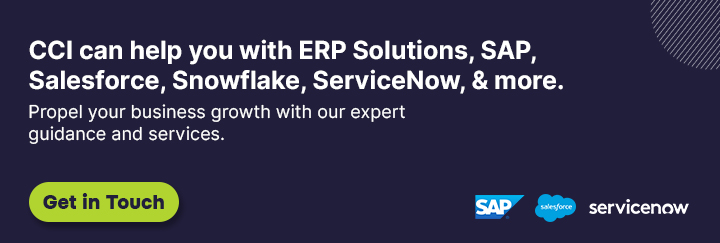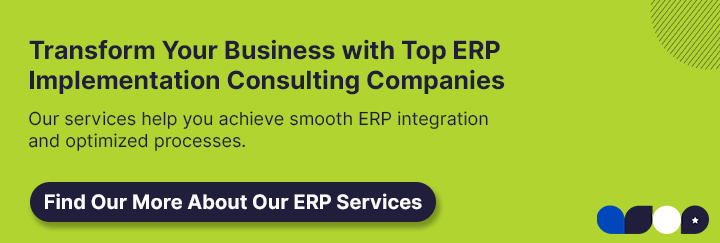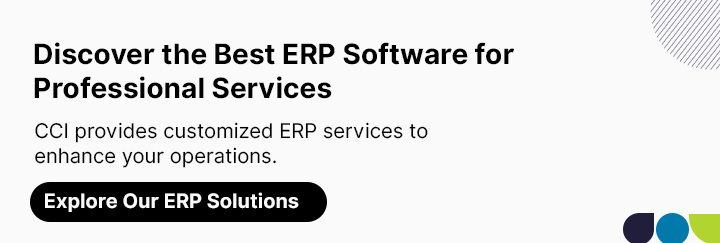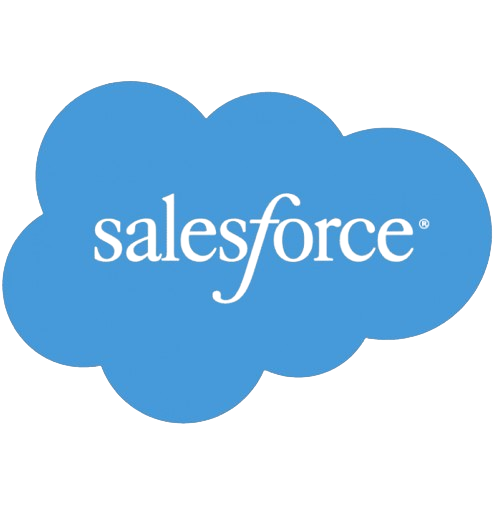Salesforce vs ServiceNow: Which One is Better in 2025?
Updated on February 19, 2026
Salesforce and ServiceNow are two leading cloud platforms that cater to distinct business needs. While Salesforce focuses on customer relationship management (CRM), ServiceNow specializes in workflow automation and enterprise service management. This blog will delve deep into these platforms’ features, advantages, drawbacks, and industry applications, providing clarity for businesses deciding which to choose.
>> Related Post: SAP vs ServiceNow: Which is Better in 2025?
Features of Salesforce
Salesforce is a CRM platform that empowers businesses to connect with their customers. Key features include:
- Sales Cloud: A tool for managing leads, opportunities, and sales forecasts, enabling teams to close deals efficiently. With customizable dashboards and AI-driven insights, Sales Cloud ensures sales teams stay ahead of targets and build lasting customer relationships.
- Service Cloud: Facilitates omnichannel customer support and case management with AI-powered tools like Einstein Bots. This feature ensures faster response times, personalized customer interactions, and seamless issue resolution across various channels.
- Marketing Cloud: Helps design personalized marketing campaigns, track customer journeys, and analyze campaign performance. Businesses can deliver the right message at the right time, fostering deeper connections with their audience.
- Einstein AI: Provides predictive analytics, intelligent recommendations, and automation for enhanced decision-making. By uncovering trends and automating repetitive tasks, Einstein AI empowers teams to focus on strategic priorities.
- Field Service Lightning: Aids in managing on-site services, scheduling, and dispatching with real-time updates. It enhances efficiency in field operations, ensuring technicians arrive on time with the tools and information they need.
- Integration: Smooth connectivity with third-party apps and Salesforce’s vast ecosystem, including tools for analytics and app development. This ensures businesses can create a unified tech stack that aligns with their unique workflows.
>> Related Article: Salesforce and WhatsApp Integration in 2025
Features of ServiceNow
ServiceNow focuses on enterprise workflow automation, ensuring internal processes run smoothly. Notable features include:
- IT Service Management (ITSM): Centralizes IT operations with incident management, problem-solving, and change management tools. ITSM improves operational efficiency by automating repetitive tasks and ensuring timely issue resolution.
- Customer Service Management (CSM): Automates and integrates customer support tasks into broader workflows. This enables businesses to provide proactive service while reducing operational costs.
- HR Service Delivery: Streamlines onboarding, employee self-service, and HR case management. It enhances the employee experience by simplifying access to HR resources and reducing administrative bottlenecks.
- Field Service Management: Automates work order scheduling and dispatching for field teams. This feature ensures timely service delivery and optimizes resource allocation for on-site tasks.
- Now Platform: Offers low-code development for creating custom workflows and applications. The platform empowers businesses to innovate rapidly and address unique operational challenges.
- ESG Management: Tracks and manages sustainability goals and compliance metrics across organizations. It helps companies align with regulatory requirements and achieve their environmental, social, and governance objectives.
>> Related Post: ServiceNow Pricing: Implementation Cost in 2025
Pros and Cons of Salesforce
Pros:
- Comprehensive tools for sales, marketing, and service. These tools enhance customer engagement and streamline operations, ensuring businesses achieve their goals.
- Extensive customization options. Businesses can customize Salesforce to fit their specific requirements, making it a versatile solution for various industries.
- AI-powered analytics for proactive decision-making. Einstein AI offers actionable insights that drive more thoughtful strategies and improve overall performance.
- Large ecosystem of third-party integrations. Salesforce’s AppExchange marketplace provides access to thousands of applications, enabling seamless functionality.
Cons:
- The steeper learning curve for new users. While powerful, Salesforce’s extensive features require time and training to master effectively.
- High licensing costs can be a barrier for small businesses. The efficient capabilities come with a price tag that may not suit limited budgets.
- Customization requires significant expertise. Adjusting Salesforce to specific needs often demands skilled developers, adding to implementation costs.
>> Related Post: Snowflake vs ServiceNow: Which is Better in 2025?
Pros and Cons of ServiceNow
Pros:
- Highly effective in automating complex workflows. ServiceNow simplifies intricate processes, freeing teams to focus on strategic initiatives.
- Centralized platform for managing IT, HR, and customer service operations. It ensures consistency and efficiency across various departments.
- Low-code capabilities for rapid application development. Businesses can quickly develop and deploy solutions tailored to their needs without extensive coding expertise.
- Security and compliance features. ServiceNow safeguards sensitive data and ensures adherence to industry regulations.
Cons:
- Primarily suited for larger organizations. Small to mid-sized businesses may find ServiceNow’s comprehensive features more than they need.
- There is less focus on external customer engagement compared to Salesforce. While strong internally, it lacks the depth of CRM in Salesforce.
- It can be expensive for businesses with simpler needs. The platform’s pricing and complexity may not justify its use for straightforward operations.
>> Related Posts: Best ServiceNow Companies in 2025
Industries That Salesforce Helps the Most
Salesforce’s CRM tools excel in industries that prioritize customer engagement and personalized experiences:
- Retail: Customizes shopping experiences with detailed customer insights. By understanding buyer behavior, retailers can create targeted promotions that drive sales.
- Financial Services: Manages client relationships, compliance, and financial planning. Salesforce supports advisors in delivering personalized, regulatory-compliant financial solutions.
- Healthcare: Enhances patient engagement and manages healthcare operations. From appointment scheduling to follow-up care, Salesforce improves the patient experience.
- Telecommunications: Simplifies customer service and sales processes. It enables telecom providers to handle high interactions while maintaining quality service.
- Education: Facilitates alumni engagement and student support services. Salesforce connects institutions with students and alumni, fostering lasting relationships.
>> Related Article: Salesforce and ServiceNow Integration
Industries ServiceNow Helps the Most
ServiceNow thrives in industries where internal operations and process automation are crucial:
- Information Technology: Improves IT workflows and infrastructure management. It ensures issues are resolved swiftly and efficiently, minimizing downtime.
- Manufacturing: Automates supply chain and maintenance processes. ServiceNow optimizes production workflows, reducing delays and operational costs.
- Healthcare: Manages compliance administrative tasks. It simplifies regulatory adherence while improving overall healthcare administration.
- Government: Enhances service delivery and operational efficiency. Government agencies use ServiceNow to improve citizen services and internal processes.
- Energy: Tracks sustainability goals and optimizes operations. ServiceNow enables energy companies to meet environmental targets while improving operational reliability.
Salesforce Services Offered by CCI
At Cloud Consulting Inc. (CCI), we provide comprehensive Salesforce solutions, including:
- Salesforce Implementation: End-to-end deployment as per your unique business needs. Our team ensures a transition to Salesforce, minimizing disruption.
- Customization Services: Configuring Salesforce tools to align with your goals. From workflows to dashboards, we customize the platform to suit your operations.
- Integration Services: Effortless integration of Salesforce with third-party applications. We enable a unified ecosystem that enhances productivity.
>> Related Article: Best Salesforce Chrome Extension in 2025
ServiceNow Services Offered by CCI
CCI’s ServiceNow professional services aim to enhance operational efficiency:
- ITSM Implementation: Set up ServiceNow ITSM to manage your IT workflows effectively.
- Managed Services: Ongoing management and support for your ServiceNow platform.
- Consulting Services: Expert guidance on leveraging ServiceNow for optimal workflow automation.
- Workflow Automation: Custom workflows to simplify complex processes. Our solutions reduce manual effort and increase accuracy.
- Integration Services: Connecting ServiceNow with other enterprise systems. We create easy integrations that maximize the platform’s utility.
Conclusion
Salesforce and ServiceNow offer robust solutions but serve different business operations. Salesforce is ideal for enhancing customer relationships, while ServiceNow excels in streamlining internal workflows. By understanding your specific needs and partnering with experts like CCI, you can harness the full potential of these platforms.
FAQs: Salesforce vs ServiceNow
- What is the primary difference between Salesforce and ServiceNow?
Salesforce focuses on customer relationship management (CRM), helping businesses enhance sales, marketing, and customer support. ServiceNow, on the other hand, specializes in enterprise workflow automation, streamlining internal processes like IT, HR, and service management.
- Can Salesforce and ServiceNow be used together?
Yes, many businesses use Salesforce and ServiceNow together. Integration allows Salesforce to handle customer-facing operations while ServiceNow optimizes internal workflows, creating a comprehensive solution.
- Which platform is more suitable for small businesses?
Salesforce may be more suitable for small businesses due to its focus on customer engagement and scalable pricing options. ServiceNow, with its enterprise-oriented features, is typically better suited for larger organizations.
- What industries benefit the most from Salesforce?
Salesforce is highly beneficial for industries such as retail, financial services, healthcare, telecommunications, and education, where customer engagement and personalized experiences are priorities.
- Is ServiceNow only for IT departments?
No, while ServiceNow is popular for IT service management, it also supports HR, customer service, field operations, and sustainability management, making it versatile across various departments.
- What are the costs associated with Salesforce and ServiceNow?
Salesforce offers tiered pricing starting at $25/user/month for basic plans, while ServiceNow pricing varies based on modules, user count, and customization needs, with tailored quotes provided on consultation.
- How can CCI help implement Salesforce or ServiceNow?
Cloud Consulting Inc. provides end-to-end services for both platforms, including implementation, customization, integration, and ongoing support. Their expertise ensures businesses achieve their goals efficiently.









